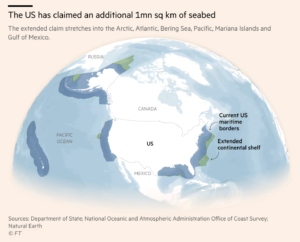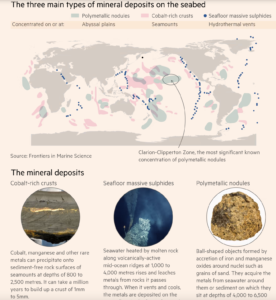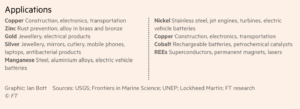March 26th, 2024
Courtesy of The Financial Times, a report on international reaction to a US claim to an extended area of seabed:
US claims to a swath of mineral-rich seabed are being challenged by China and Russia because Washington has failed to ratify a treaty that governs access to resources in international waters.
Chinese and Russian diplomats said last week that a US claim to an extended area of seabed was unacceptable given its position on the 1982 United Nations Convention on the Law of the Sea (Unclos), according to three people who attended a meeting in Kingston, Jamaica of the International Seabed Authority, which was established under the treaty.
Hundreds of former US government officials and military officers recently wrote to Senate leaders urging the body to ratify Unclos. This would ensure that the US could harvest critical minerals from the ocean floor once the ISA has agreed regulations for deep-sea exploration, which may come next year.
The signatories included Democratic former secretary of state Hillary Clinton, Republican former deputy secretary of state John Negroponte and Dennis Blair, a former national intelligence director and retired admiral.
The Chinese and Russian objections came after the US in December said it would extend its jurisdiction over a resource-rich seabed area that makes up its continental shelf. The extended area is twice the size of California and spans regions that include the Pacific and Atlantic oceans, the Gulf of Mexico and other regions.
One person familiar with the situation said the US and other countries were entitled to extend their continental shelves under international law. He said the Chinese and Russian delegations to the ISA conference expressed opposition, which prompted a rebuttal from the US delegation, which only has observer status because Washington has not ratified Unclos.
Rebecca Pincus, director of the Polar Institute at the Wilson Center, said the criticism was probably driven by competition over seabed resources such as minerals and also undersea cables. “It’s warfare, part of great power politics?.?.?.?and an opportunity to be disruptive,” she said.
The tensions come as the Biden administration faces domestic pressure to compete with China on deep-sea mining ahead of an expected Pentagon report on the sourcing and processing of seabed metals mandated by Congress.
The push to ratify Unclos, which is being led by Blair, comes more than a decade after a previous effort to get the Senate to act. Ratification requires support of two-thirds of the 100 senators. Any effort to pass the treaty will almost certainly evaporate if Donald Trump wins the US presidential election.
Concern has also grown as the US worries about China’s efforts to gain more top positions in international bodies and take advantage of situations, as with Unclos, where the US has less power.
Negroponte, who also served as Director of National Intelligence, said Chinese efforts to press expansive and illegal claims in the South China Sea in recent years has given more impetus to the need to ratify Unclos. He said China had already registered five mineral-rich ocean sites with the ISA, which the US cannot join unless it ratifies Unclos.
China argues that its claims to the South China Sea are justified by the “long course of history” and has refused to recognise a 2016 arbitration ruling in favour of maritime territorial claims by the Philippines under Unclos.
“We have already lost two of the four such sites originally designated for us in the Unclos negotiation, each site holding an estimated value of $1tn of copper, nickel, cobalt, manganese and rare earths,” said Negroponte. “Unless we join soon, we are at risk of losing our two remaining designated sites.”
Companies wishing to explore for minerals in international waters must apply to the ISA with the backing of a member state. Not ratifying Unclos means the US cannot sponsor licences. It has been on the sidelines of meetings continuing until Friday between the ISA’s 169 members to discuss whether commercial mining should proceed at scale.
Failing to obtain licences for deep-sea minerals could leave the US at the “mercy” of China’s bid to dominate the supply of battery metals globally, Virginia representative Rob Wittman, the Republican vice-chair of the House armed services committee, told the Financial Times.
“China and Russia are aggressively laying claim to the minerals on those bottoms?.?.?.?we cannot allow that to happen,” Wittman said.
Jose Fernandez, a top state department official, last month told the FT that China’s bid to dominate the supply chain for critical minerals onshore and offshore created a joint “vulnerability” for Washington. He said they were trying to do in subsea mining what they had done in terrestrial mining, which was to “gain greater control of critical minerals for the future”.
The Metals Company, a Nasdaq-listed, Vancouver-based company at the forefront of efforts to mine the Pacific seabed, has been lobbying US lawmakers for support measures, including federal funds for a proposed mineral processing plant on the coast of Texas.
“The opportunity for America is to embrace companies like us. The risk is that they don’t and other markets like China do,” said CEO Gerard Barron. One option being explored by Oliver Gunasekara, chief executive of US-based Impossible Metals, is retrieving minerals from the country’s own territorial waters off the coast of American Samoa in the south Pacific Ocean.
“What people often don’t remember is there are these [metallic] nodules in US waters,” he said. A study released last year also noted prospective deposits in the US exclusive economic zone near California, Alaska, Hawaii and off its south-eastern coast.
A question mark remains over how far a global sea mining industry would need states’ support to compete on costs with terrestrial mining.
Proponents of deep-sea mining would also have to overcome staunch opposition from environmental groups, who argue that exploiting the seabed could harm marine ecosystems including rare species that have evolved to survive thousands of metres below the surface.
Focusing primarily on The New Seven Sisters - the largely state owned petroleum companies from the emerging world that have become key players in the oil & gas industry as identified by Carola Hoyos, Chief Energy Correspondent for The Financial Times - but spanning other nascent opportunities around the globe that may hold potential in the years ahead, Wildcats & Black Sheep is a place for the adventurous to contemplate & evaluate the emerging markets of tomorrow.



